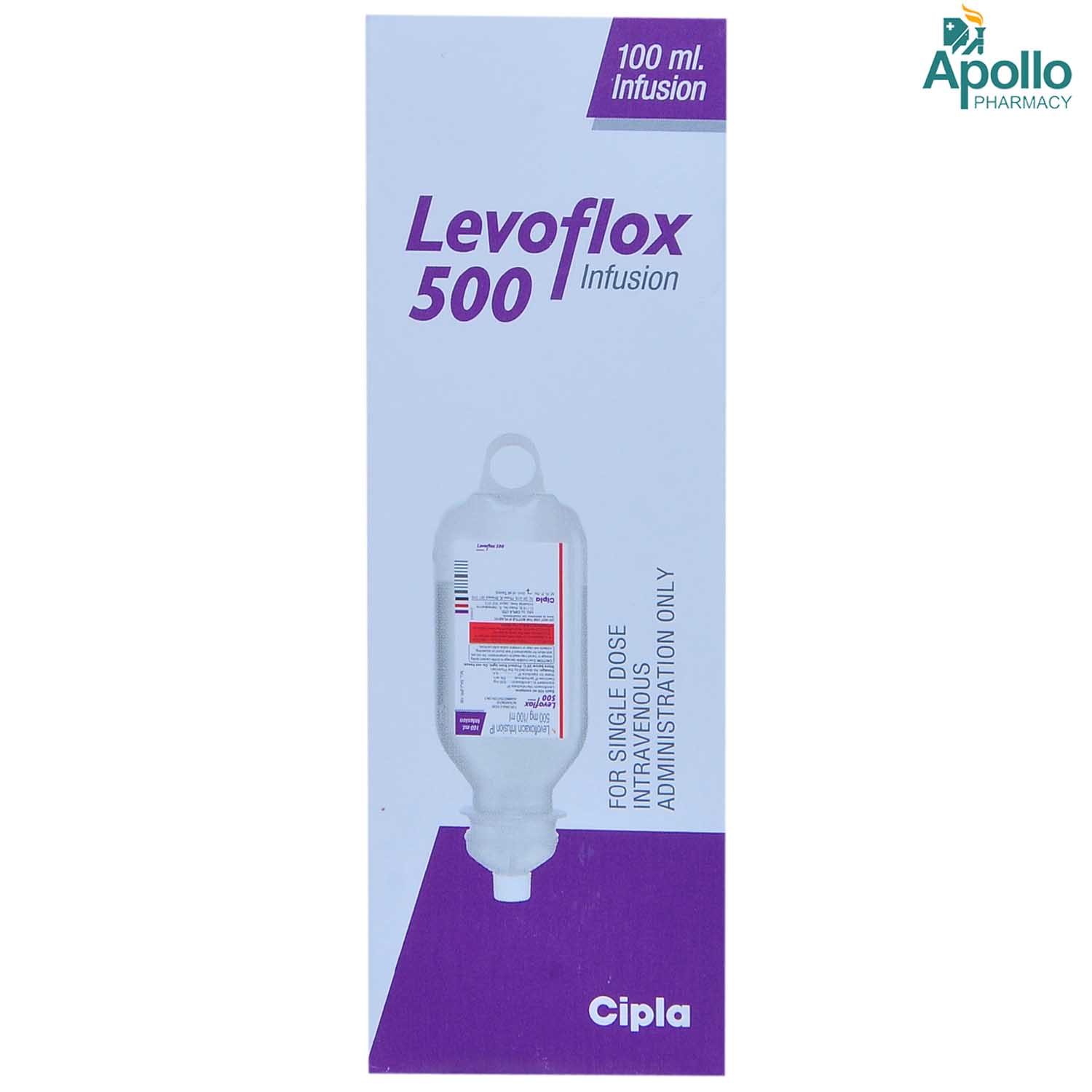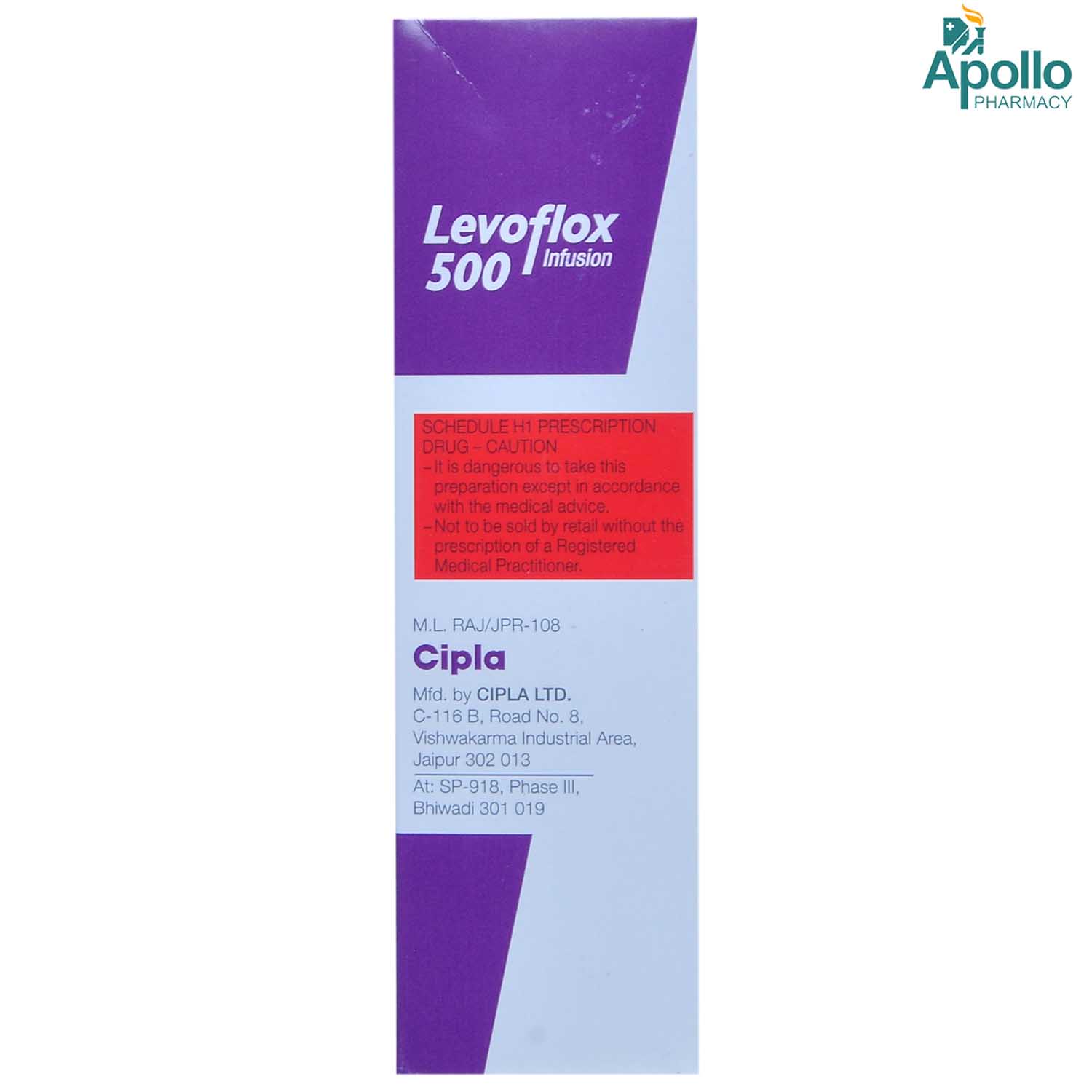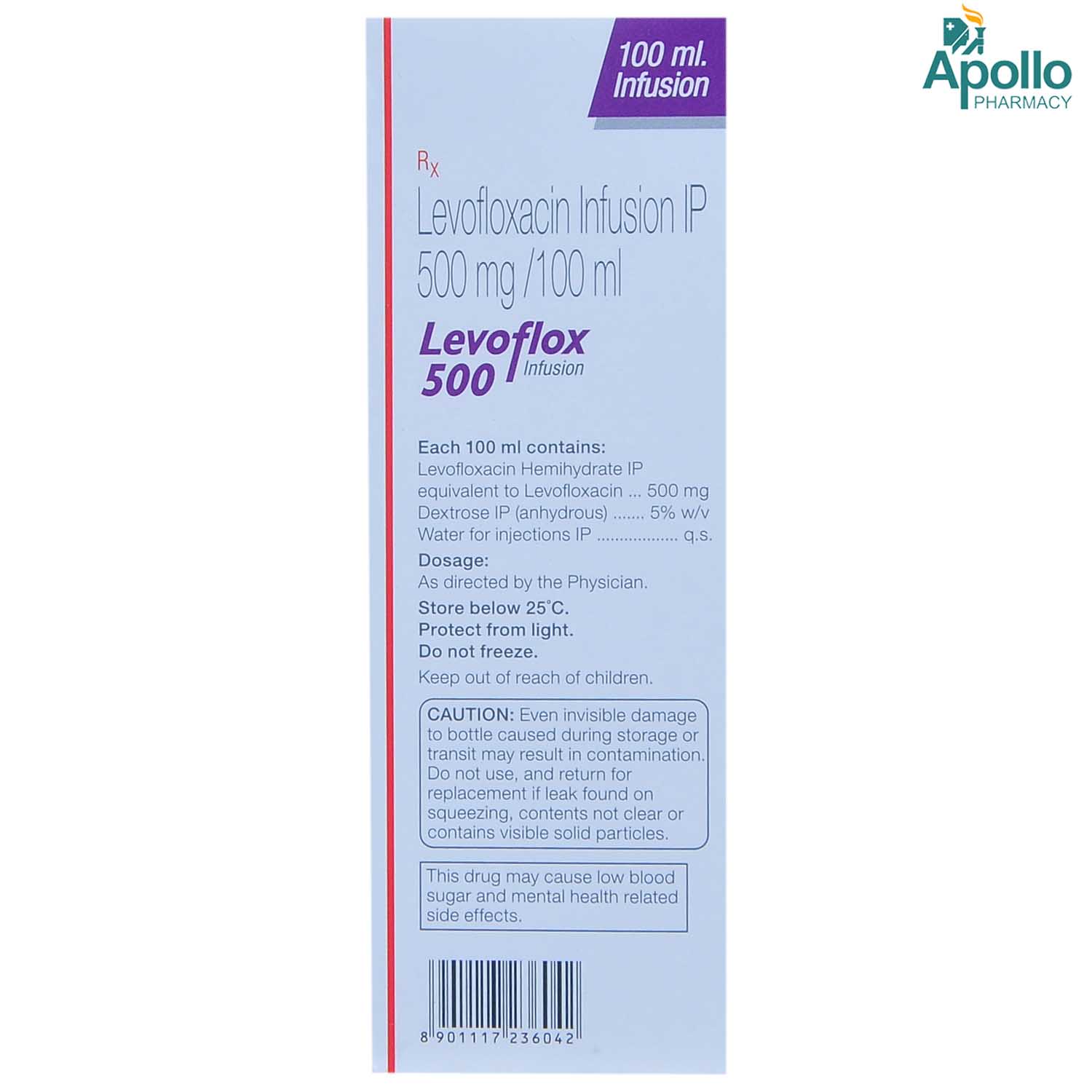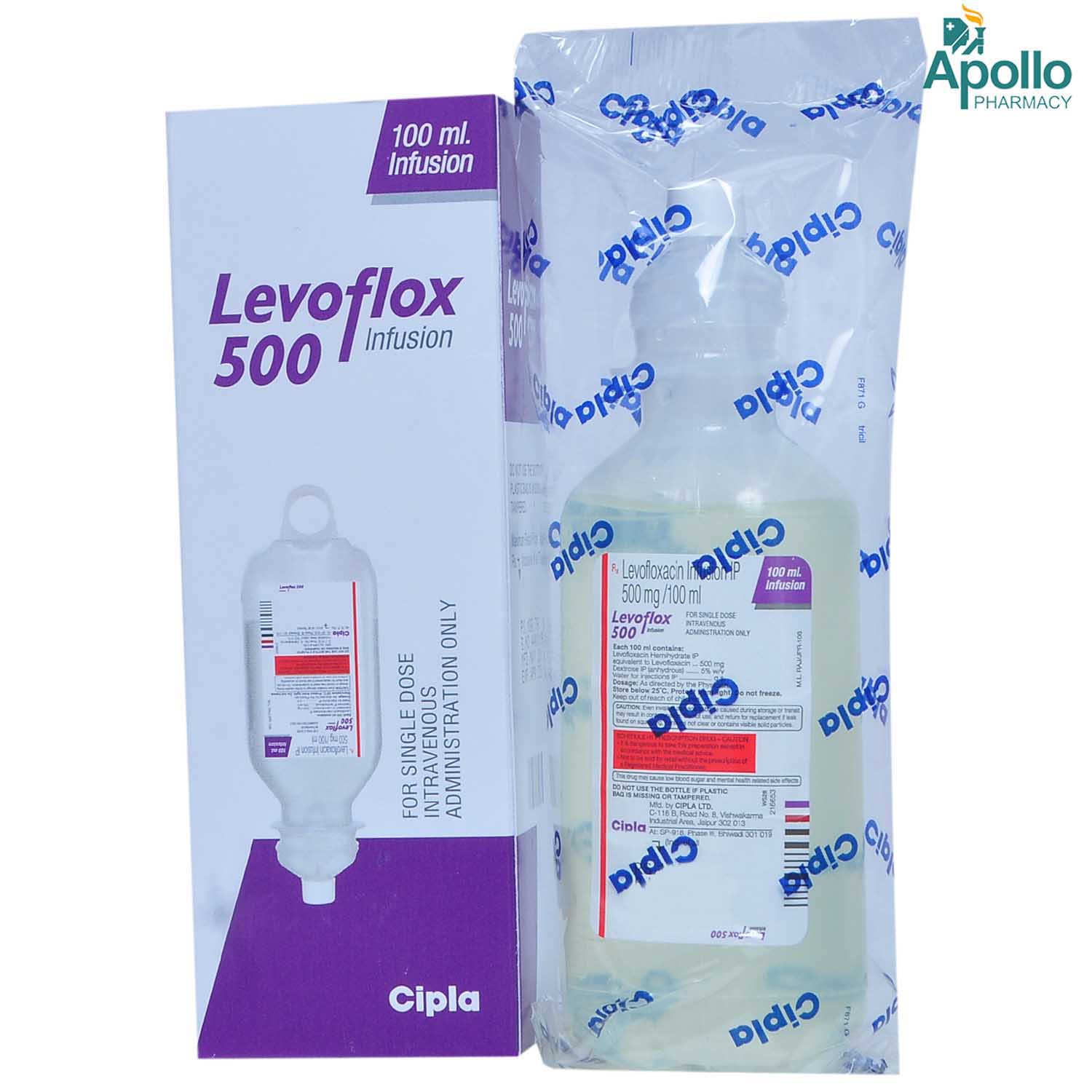Levoflox 500 Infusion 100 ml
MRP ₹259
(Inclusive of all Taxes)
₹38.9 Cashback (15%)
Provide Delivery Location
Online payment accepted
 Prescription drug
Prescription drugWhats That
Composition :
Manufacturer/Marketer :
Consume Type :
Expires on or after :
Return Policy :
About Levoflox 500 Infusion
Levoflox 500 Infusion belongs to the class of antibiotics. It is a highly effective antibiotic that works against a variety of bacteria. Levoflox 500 Infusion is used in a variety of bacterial infections, most importantly acute pneumonia (Lung infection), bronchitis (Inflammation of lung passages), skin infections, as well as urinary tract infection. A bacterial infection is a condition in which bacteria grows in the body and causes infection. It can target any body part and multiple very quickly.
Levoflox 500 Infusion contains levofloxacin and Dextrose. Levofloxacin (fluoroquinolone antibiotic) sticks to enzymes (Topoisomerase IV & DNA gyrase) responsible for the division of bacteria & stops the multiplication of bacteria & killing bacteria. Dextrose (glucose) is used as a diluent (a substance used to dilute something) to supply calories and fluids (levofloxacin) to the body. Thus, Levoflox 500 Infusion together works by preventing infection and providing energy to the body.
Levoflox 500 Infusion will be administered by a trained healthcare professional; hence do not self-administer. The dose of Levoflox 500 Infusion can vary depending on your condition and the severity of the infection. In rare cases, side effects of Levoflox 500 Infusion include vomiting, nausea, diarrhea, headache, constipation, dizziness, and injection site reactions (pain, swelling, redness). Everyone need not experience the above side effects. In case of any discomfort, speak with a doctor.
Before starting Levoflox 500 Infusion , please inform your doctor if you have any allergy (against any antibiotic), kidney or liver problems, epilepsy, or tendon disorders. Do not use Levoflox 500 Infusion on your own, as self-medication may lead to antibiotic resistance in which antibiotics fail to act against specific bacterial infections. Inform your doctor before taking Levoflox 500 Infusion if you are a pregnant/breastfeeding mother. Levoflox 500 Infusion should be used with caution in peripheral neuropathy, psychotic disorders, myasthenia-gravis, hypoglycemia, hyperglycemia, heart problems, and bullous skin reaction.
Uses of Levoflox 500 Infusion
Directions for Use
Key Benefits
Levoflox 500 Infusion contains levofloxacin, and dextrose belongs to the class of antibiotics. Levofloxacin (fluoroquinolone antibiotic) sticks to enzymes (Topoisomerase IV & DNA gyrase) responsible for the division of bacteria & stops the multiplication of bacteria & killing bacteria. Dextrose (glucose) is used as a diluent (a substance used to dilute something) to supply calories and fluids (levofloxacin) to the body. Thus Levoflox 500 Infusion together works by preventing the infection and providing energy to the body. Levoflox 500 Infusion is a highly effective antibiotic that works against various bacteria. Levoflox 500 Infusion is used in various bacterial infections, most importantly acute pneumonia (Lung infection), bronchitis (Inflammation of lung passages), skin infections, and urinary tract infection.
Storage
Drug Warnings
Before starting Levoflox 500 Infusion , please inform your doctor if you have any allergy (against any antibiotic), kidney or liver problems, epilepsy, or tendon disorders. Do not self-administer Levoflox 500 Infusion . It is administered through a healthcare professional. Do not take Levoflox 500 Infusion on your own, as self-medication may lead to antibiotic resistance in which antibiotics fail to act against specific bacterial infections. Inform your doctor before taking Levoflox 500 Infusion if you are a pregnant/breastfeeding mother. Levoflox 500 Infusion should be used with caution in peripheral neuropathy, psychotic disorders, myasthenia-gravis, hypoglycemia, hyperglycemia, heart problems, skin bullous reaction, glucose-6-phosphate dehydrogenase deficiency, and vision disorders. Dairy products should be avoided along with Levoflox 500 Infusion . And also, exposure to sunlight should be avoided while taking Levoflox 500 Infusion as it may cause increased phototoxicity or photosensitivity.
Diet & Lifestyle Advise
- Dairy products such as milk and yogurt must be avoided for at least 2 hours before and after taking medicine.
- Maintaining good hygiene is essential.
- Have more fibre-enriched food in your diet, as it can be easily digested by gut bacteria, which helps stimulate their growth. Thus, fibre-rich foods may help restore healthy gut bacteria after antibiotics.
- After taking the full course of levofloxacin, probiotics should be taken to recover healthy bacteria that could have been destroyed in the intestines. The risk of antibiotic-associated diarrhea by antibiotic treatment can be minimized by taking probiotics.
Side Effects of Levoflox 500 Infusion
- Vomiting
- Nausea
- Fast/irregular heartbeat
- Diarrhea
- Heartburn
- Abdominal or stomach pain or discomfort
- Headache
- Difficulty sleeping
- Constipation
- Dizziness
- Injection site reactions (pain, swelling, redness).
Habit Forming
Therapeutic Class
All Substitutes & Brand Comparisons
FAQs
Levoflox 500 Infusion contains levofloxacin and Dextrose. Levofloxacin (fluoroquinolone antibiotic) sticks to enzymes (Topoisomerase IV & DNA gyrase) responsible for the division of bacteria & stops the process of multiplication of bacteria & hence killing bacteria. Dextrose (glucose) is used as a diluent (a substance used to dilute something) to supply calories and fluids (levofloxacin) to the body. Thus Levoflox 500 Infusion together works by preventing the infection and providing energy to the body.
Levoflox 500 Infusion may cause common side effects like vomiting, nausea, diarrhea, headache, constipation, dizziness, and injection site reactions (pain, swelling, redness). Everyone need not experience the above side effects. In case of any discomfort, speak with a doctor.
Yes, diarrhea may be caused by Levoflox 500 Infusion . It is an antibiotic that destroys dangerous bacteria by killing them. Nonetheless, it also affects the beneficial bacteria in your stomach or gut and causes diarrhea. Talk to your doctor about it if you have serious diarrhea.
Take the missed dose as soon as possible and try not to take a double dose to make up for the missed dose, as it may cause harmful effects.
It is recommended not to stop taking this drug without completing the course as prescribed by a doctor. If a patient stops taking this drug by himself/herself, It may be difficult to treat future infections with Levoflox 500 Infusion due to resistance that microbes develop on non-completion of the drug course.
Levoflox 500 Infusion may rarely cause tendonitis/bursitis; if you feel discomfort, consult your doctor immediately.
Drug-Drug Interactions Checker List
- ASPIRIN
- DICLOFENAC
- CIMETIDINE
- PROBENECID
- CYCLOSPORINE
- CLARITHROMYCIN
- ERYTHROMYCIN
- INSULIN
- GLIBENCLAMIDE
- WARFARIN
- PHENYTOIN
- VALPROATE
- AMIODARONE
- AMITRIPTYLINE
Special Advise
- Monitor liver function test (LFT), renal function test, white blood cell count, and blood glucose level in diabetic patients as Levoflox 500 Infusion may cause harmful interactions in these patients.
- Notify your doctor if you feel pain in your tendons, numbness or tingling sensations.
- Do not self-administer Levoflox 500 Infusion .
Disease/Condition Glossary
A bacterial infection is a condition in which harmful bacteria enter, multiply and infect our bodies. It can target any body part and multiple very quickly. When you get infected with bacteria, you can experience generalized symptoms like fevers, chills and fatigue. Bacteria are of various forms comprising, commonly spherical, rod and spiral-shaped. Bacterial infections vary from minor illnesses like sore throat and ear infections to severe brain infections like meningitis and encephalitis. A few harmful bacteria that cause infections include Streptococcus, Staphylococcus and E. coli. Anyone can become infected with a bacterial infection. People with weak immune systems or taking immunosuppressive medicine can make them more prone to bacterial infection.

Have a query?
Alcohol
Safe if prescribed
Avoid consumption of alcohol while on treatment with Levoflox 500 Infusion .
Pregnancy
Consult your doctor
It is not known whether Levoflox 500 Infusion will affect pregnancy or not. Hence, inform your doctor if you are pregnant before receiving Levoflox 500 Infusion .
Breast Feeding
Consult your doctor
If you are breastfeeding, inform your doctor before receiving Levoflox 500 Infusion . It is excreted in human milk. But the amount of Levoflox 500 Infusion absorbed by the nursing infant is unknown.
Driving
Safe if prescribed
After taking this drug, you can experience side effects like dizziness, tiredness, a spinning sensation (vertigo), or alterations in your vision. If this occurs, do not drive or perform any work that requires concentration until you are alert.
Liver
Consult your doctor
Levoflox 500 Infusion should be used with caution in patients with liver disease. Dose adjustment may be needed. If you have pre-existing or a history of liver disease, please inform your doctor before receiving this infusion.
Kidney
Consult your doctor
Levoflox 500 Infusion should be used with caution in patients with kidney disease. Dose adjustment may be needed. If you have pre-existing or a history of kidney disease, please inform your doctor before receiving this infusion.
Children
Safe if prescribed
Levoflox 500 Infusion can be given to children under medical supervision. The dose of this medicine will be decided by your doctor based on the age and condition of your child.











